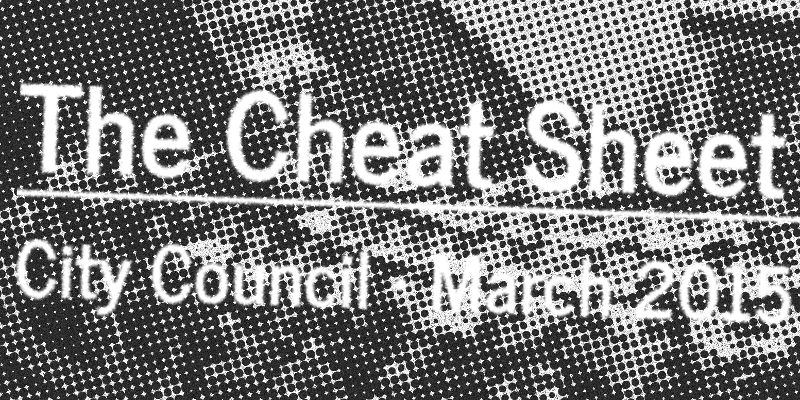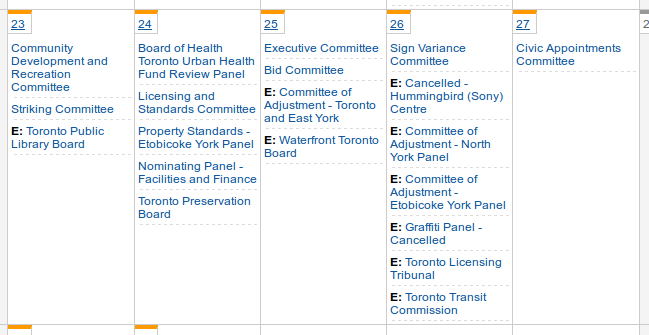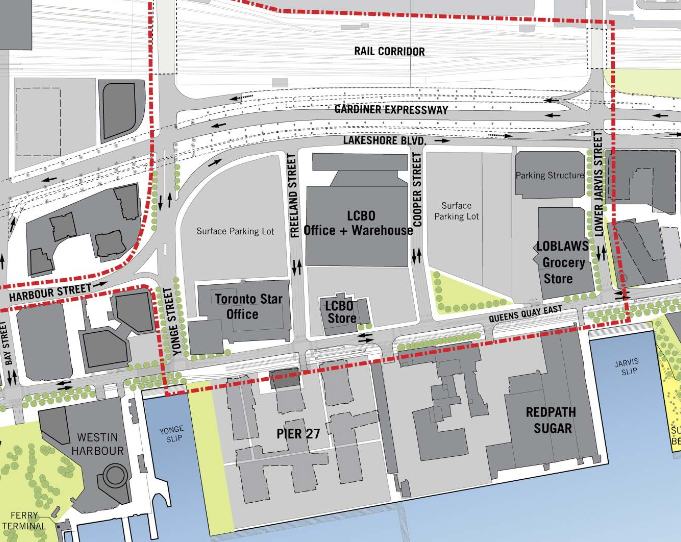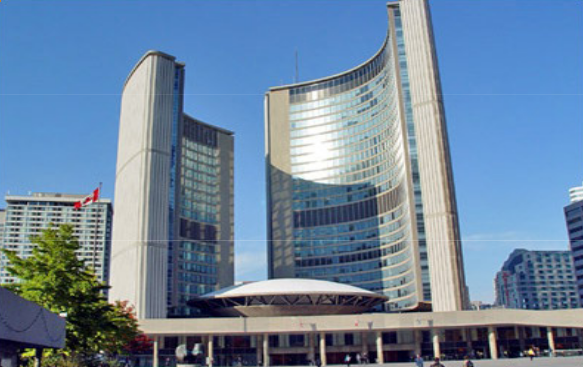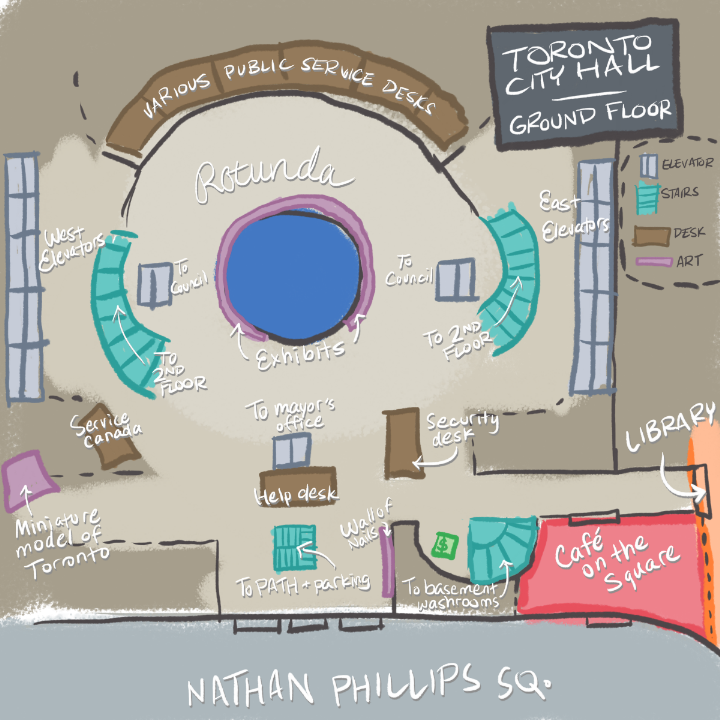Just in time for my 30th birthday, I’m getting the best present ever: a City Council meeting! This month’s agenda is jam-packed with important items, so fix yourself a drink while you read this. Up for discussion: funding the Scarborough subway, diversity on the TTC board, a new City Manager, the social housing waitlist, (not) fixing basement flooding, and more. Continue reading The Cheat Sheet: May 5 City Council
Category: toronto
The Cheat Sheet: March 31 City Council
Agenda • Meeting Monitor • Livestream
My apologies to everyone for this late Cheat Sheet! The recent cold snap shocked me back into hibernation, and I have spent most of the last few days asleep.
If you read the previous committee meeting Cheat Sheet you may recognize several items on this City Council agenda. Accountability officer shakeup, Fimbulwinter, oil pipelines, taxi law, the Spadina subway extension, drones, spruce, Baby Point, a Baudelaire reference, and more below the fold. Continue reading The Cheat Sheet: March 31 City Council
“Those who continue to face unfair and unequal provision of city services”
Much is at stake for the future of accountability at the City of Toronto. A modern government cannot expect to retain the confidence of the people unless it is willing to hold itself accountable by submitting itself to the kind of scrutiny an independent ombudsman provides. While Council recognizes this in principle, insufficient finances increasingly contradict that support.
The residents of Toronto count on their municipal government to properly fund the office in order to meet our mandate effectively. That assumption remains unfulfilled, even though the money required is an investment in a strong system of accountability that produces savings and good governance.
I reluctantly have to warn Council and the public, again, that our ability to meet our statutory mandate defined by provincial legislation is undermined by a lack of funding. Toronto cannot have a legislated ombudsman who is “independent” and then have the office’s work indirectly controlled through budget allocation.
It could be said that the office is a victim of its own success. But that loses sight of who is important. The real victims of this funding shortfall are the residents who will not be able to get swift action on their complaints, those who continue to face unfair and unequal provision of city services.
—Ombudsman Fiona Crean in her 2014 annual report
The Cheat Sheet: Committee Meetings, Mar. 23-27
Here’s a quick overview of this week’s committee meetings at City Hall! Issues to watch for: shelter beds and affordable housing, election accessibility, ferry terminal designs, the Spadina subway extension, and more. Continue reading The Cheat Sheet: Committee Meetings, Mar. 23-27
The Cheat Sheet: Committee Meetings, Feb. 23-27
Wall-to-wall committee meetings this week! Following committee meetings is a great way to “preview” items before they go to City Council — and, if you want, voice your opinions. Also, petty drama is 100% guaranteed. Continue reading The Cheat Sheet: Committee Meetings, Feb. 23-27
The Cheat Sheet: February 10 City Council
They say Toronto has four seasons: winter, construction, transit debates, and complaining about liquor licences. At least, I think that’s how it goes. But there’s plenty more to talk about on this doozy of an agenda. Continue reading The Cheat Sheet: February 10 City Council
Financial Facelift: Debt doubts cast shadow for world-class city with major expenses
Toronto chose to put low taxes ahead of infrastructure and services, but it has put her in a bit of a bind. She is 181 years old and has diverse thriving industries, a vibrant cultural scene, and well-loved municipal services like parks and libraries.
She has several major expenses, ranging from large-scale capital projects to everyday service improvements, all of which she wants to pay for without raising taxes or going into debt. As the nation’s economic hub, Toronto has substantial earning power — but she chooses to take in less revenue than she could. Continue reading Financial Facelift: Debt doubts cast shadow for world-class city with major expenses
The Cheat Sheet: Dec. 11 City Council
The first real City Council meeting snuck up on me! Much of the agenda will be familiar if you followed last week’s Executive Committee meeting. SmartTrack makes its debut, the budget schedule gets settled, and Mammoliti’s in trouble again.
The Cheat Sheet: Going To City Hall
With the 2014-2018 term about to start, I thought I’d provide a brief primer for people who want to start watching City Hall in person. Where to go, what to see, where to eat, and more. Continue reading The Cheat Sheet: Going To City Hall
Actually, It’s About Ethics In Canadian Journalism
David Hains, “Lessons from Rob Ford’s City Hall”:
As much as you’d like to hope that City Hall is too big and important an institution to be filtered through one man, that is not the case. Time and again, our public conversations have been distilled through Rob Ford’s ideology, preferences, and id. Rather than discussing important issues, like the funding crisis at Toronto’s social housing agency, we heard about the chief magistrate’s homophobia, racism, and misogyny. Would he apologize this time? What did he really mean, though? What would he say to Joe Warmington?
I think that there’s a sense in the press that they don’t want to start something. They want to respond to something. I think that’s a misunderstanding of what the world of the press should be. I think the Toronto Star is the exception to the rule I’m about to describe, but I think, generally speaking, the Canadian press has strayed from its basic connection to its audience. We should be running toward things that have not broken yet. News should be what people don’t know about yet. Everybody is just sort of chewing on the same bone. To be in a completely responsive mode is not responsible journalism.
It’s been incredibly vindicating to see Jesse Brown come along and make these criticisms of the industry. Not that we haven’t been yelling our heads off, but there are an awful lot of media people who will only take it seriously if it comes from the the right sort of white guy. (I don’t think they even realize they do this.) If you are one of those media people, go play outside. Everyone else, keep reading: Continue reading Actually, It’s About Ethics In Canadian Journalism

